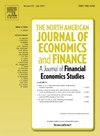网络安全风险与企业成长:基于文本分析的经验证据
IF 3.9
3区 经济学
Q1 BUSINESS, FINANCE
North American Journal of Economics and Finance
Pub Date : 2025-09-26
DOI:10.1016/j.najef.2025.102542
引用次数: 0
摘要
尽管网络安全风险已成为重要的企业威胁,但对有效预防和应对策略的研究仍然有限。本研究以2010 - 2022年沪深两市a股上市公司为样本,采用文本分析法构建中国上市公司网络安全风险指标,系统考察网络安全风险对企业成长的影响。研究结果显示,网络安全风险显著抑制企业成长。机制分析表明,网络安全风险通过增加企业的过度现金持有量、放大经营风险、加剧融资约束等方式对经济增长产生负面影响。进一步分析表明,在技术密集型行业、规模较大、媒体关注度较高、分析师关注度较高的企业中,增长抑制效应更为明显。本研究为指导企业制定先发制人的网络安全战略、支持监管机构实施差异化治理、帮助政府完善网络安全激励机制提供了实证依据。这些措施有助于企业在增长与风险之间取得平衡,同时支持有效的网络安全治理。本文章由计算机程序翻译,如有差异,请以英文原文为准。
Cybersecurity risk and firm growth: Empirical evidence based on text analysis
Despite cybersecurity risk emerging as a critical firm threat, research on effective prevention and response strategies remains limited. Using a sample of A-share listed companies in Shanghai and Shenzhen from 2010 to 2022, this study adopts text analysis to construct indicators that portray the cybersecurity risk of Chinese listed companies and systematically examines the impact of cybersecurity risk on firm growth. The findings reveal that cybersecurity risk significantly inhibits firm growth. Mechanism analysis indicates that cybersecurity risk adversely impacts growth by increasing firms’ excessive cash holdings, amplifying operational risks, and exacerbating financing constraints. Further analysis shows that the growth-inhibiting effect is more pronounced among firms in technology-intensive industries, larger scale, higher media attention, and higher analyst attention. This study provides empirical evidence to guide firms in developing preemptive cybersecurity strategies, supports regulators in implementing differentiated governance, and helps governments refine cybersecurity incentives. These measures help firms strike a balance between growth and risk while supporting effective cybersecurity governance.
求助全文
通过发布文献求助,成功后即可免费获取论文全文。
去求助
来源期刊
CiteScore
7.30
自引率
8.30%
发文量
168
期刊介绍:
The focus of the North-American Journal of Economics and Finance is on the economics of integration of goods, services, financial markets, at both regional and global levels with the role of economic policy in that process playing an important role. Both theoretical and empirical papers are welcome. Empirical and policy-related papers that rely on data and the experiences of countries outside North America are also welcome. Papers should offer concrete lessons about the ongoing process of globalization, or policy implications about how governments, domestic or international institutions, can improve the coordination of their activities. Empirical analysis should be capable of replication. Authors of accepted papers will be encouraged to supply data and computer programs.

 求助内容:
求助内容: 应助结果提醒方式:
应助结果提醒方式:


